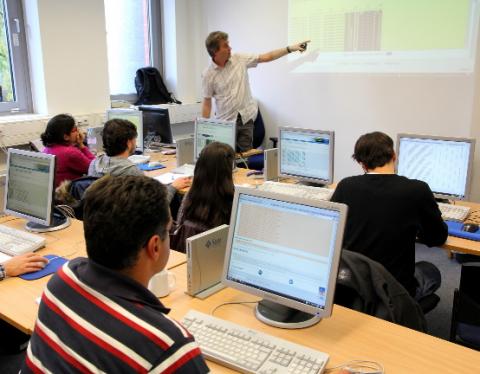- Home
- About
- OSD
- MyOSD
- Partners
- Work Packages
- WP 1Management & Coordination
- WP 2 (OSD)Ocean Sampling Day
- WP 3Oceanography & Environmental Data
- WP 4Standards and Interoperability
- WP 5Bioinformatics & Data Integration
- WP 6Exploring Ecosystems Biology
- WP 7Function and Biotechnology
- WP 8Intellectual Property (IP) Management for Marine Bioprospecting
- WP 9Dissemination & Outreach
- Public DeliverablesAll Micro B3's public deliverables
- Meetings
- Workshops
- Third Micro B3 Industry Expert Workshop
- Micro B3 Industry Expert Workshop
- Micro B3/OSD Analysis Workshop
- Micro B3 Stakeholder Workshop
- Micro B3 Summer School in Crete 2014
- Marine Metagenomics Bioinformatics
- Micro B3 Industry expert workshop
- EU-US Training 2013
- Micro B3 Statistics Training 2013
- MG4U Bioinformatics Training 2013
- Bioinformatics Training 2012
- EU-US Training 2012
Dissemination & Outreach
Rationale and objectives

A training and dissemination committee with representatives from science, industry and policy-advisory bodies is mixing and matching the different expertise of the Micro B3 partners. It assists in performing training for scientists (RIBOCON, HCMR, CSIC, CNRS, EMBL-EBI), exchanging information and providing advice through workshops to marine stakeholders (CIESM), in legal aspects of biodiversity protection (UCL) as well as in industrial biotech fields (BIO-ILIBERIS). Thus a broad scope of users can be covered and new ideas generated and implemented.
Activities include workshops for the interested public, including policy-makers and dedicated short workshops for interaction with industry. Scientific training is organized into three course formats of different lengths, including one summer school. It provides bioinformatics expertise to young Micro B3 scientist, and later also to the participants of the Ocean Sampling Day (OSD) before and after this event. They and the trained new generation will be the seed for disseminating Micro B3 standards and tools. Courses or at least modules are planned to provide models for later repetition, and thus will be thoroughly documented. Where feasible multipliers will be selected to participate in order to enable this on smaller e.g. regional scales and in other languages where appropriate and useful to generate more long-term sustainability in capacity building.
To establish a flexible workshop and training environment in a highly collaborative effort is one of the mid- to long term goals of Micro B3. Such a continuous and consistent training pipeline involving all emerging bioinformatic and biodiversity infrastructures in Europe (MIRRI, LifeWatch, ELIXIR and EMBRC) would enable European scientists to continue “playing in the Champion’s League within marine microbial diversity research and innovation”.
Recent progress
EMPA has designed a detailed survey on stakeholders’ specific training and information needs. This was done to select topics and formats for workshops and courses for the communities of marine scientists and for small and large enterprises interested in marine biotechnology, Omics and bioinformatics, which are not yet readily available on the market. The members of the committee provided input, helped with spreading the questionnaire and partially helped with assessing its outcome.
The Micro B3 Stakeholder Analysis is used to build a dedicated bioinformatics training pipeline and has led to three different short training courses being designed, instead of repeating the first one, as originally envisaged. It is also instrumental in getting input for three planned expert workshops linking academia to industry. A special set of questions on IPR issues addressed different topics in this field as part of the expert workshop section.
The questionnaire was distributed via direct contacts, mailing lists and multipliers to different stakeholders reaching a total of 24 countries mostly in Europea. More than 2000 people were contacted to fill in the questionnaire, using the EuroMarine mailing list and other channels. To enhance industry feedback a second round of circulation was done using Marine Genomics for users (MG4U) industry contacts, and especially the attendants of two Think Tanks at the BioMarine 2012 Business Convention, in which Dr. Wesnigk (EMPA) and Prof. Glöckner (JacobsUni) were involved.

The Micro B3 project is focusing on different sets of activities: Dissemination, outreach, knowledge and technology transfer aspects, which are targeted especially towards the industrial sector including SMEs as well as policy makers and advisors in the field of biodiversity protection. This will be achieved in close cooperation with WP 7 and WP 8.
Included are:
- two stakeholder workshops, one workshop was already held 27-28 February 2013 in Brussels, one is planned for 2015 focussing on Mediterranean stakeholders
- three expert workshops with industry (see schedule below), with the first workshop in October 2013 in Groningen
- several conference sessions
An extensive plan of training activities is resulting in several courses:
- a course on bioinformatics held in 2012
- a course on biodiversity statistics and modeling held in 2013
- a course on metagenomics planned for March 2014
- a 10-day Micro B3 summer school planned to be held on Crete at HCMR in late spring 2014
- a final annotation course, date to be fixed after the OSD data has been generated
These training courses aim to provide capacity development through human resource development of the next generation of marine scientists: intensifying links and integration between marine biology, Omics technologies, oceanography, and bio- and geoinformatics.
This graph shows an overview of the very positive evaluations of the first two training courses.
For more detail see the evaluation websites for the bioinformatics and statistics courses.
Furthermore links to long-term research infrastructures (ELIXIR, EMBRC, MIRRI) are being established by Micro B3 which can promote and possibly implement further training courses based on elements developed by us, especially within the bioinformatics field. For example the metagenomics training course mentioned above is planned as a joint course at the EBI together with the BioMedBridges research infrastructure initiative.
Schedule of Industry Expert Workshops for Knowledge and Technology Transfer
|
Task/Title |
Who, where, how many |
WP 9 team |
When / how long |
|
Expert workshop 1: Bioinformatics informing biocatalysis |
Univ Groningen 50 - 80 persons |
EMPA, joint workshop with MetaExplore project |
14/15 Oct. 2013 1.5 days |
|
Expert workshop 2: |
Bio-Iliberis |
CIESM, EMPA, |
April/May 2014 1 - 2 days |
Schedule of Training Courses
|
Task/Title |
Who leads, where, how many |
WP 9 team |
When / how long |
|
Training course 1 |
CNRS, RIBOCON, Bremen, 12 persons |
EMPA, MPI |
8–12 October 2012 |
|
Training course 2 |
AWI, RIBOCON, Bremen, |
EMPA, MPI |
16-22 June 2013 |
|
Training course 3 |
EBI, RIBOCON, Hinxton |
CNRS, EMPA, MPI |
24-28 March 2014 |
WP 9 is also in part responsible for the production and updating of dissemination material like this web portal, containing many news and event links, a short film, fact sheets/articles, roll-up banners, etc.
Lead of Wp 9: Johanna Wesnigk, Environmental and Marine Project Management Agency
Further reading on marine and environmental bioinformatics training and dissemination
- Via et al., PLoS Computational Biology (2011): e1002245: Ten Simple Rules for Developing a Short Bioinformatics Training Course
- Schneider et al., Briefings in Bioinformatics (2011): doi:10.1093/bib/bbr064: Bioinformatics Training Network (BTN): a Community Resource for Bioinformatics Trainers
- ELIXIR’s training strategy committee, WP 11 Report on Recommendations for a Coordinated Approach to Bioinformatics User Training in Europe
- General Introduction to Genomic Resources: www.OpenHelix.com/cgi/curriculums.cgi
Including curriculum suggestions and a list of suggested online and print resources for designing introductory lectures on general genomics



